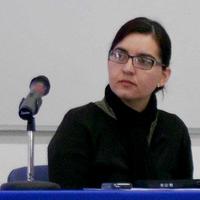
Teivo Teivainen
Professor of World Politics at University of Helsinki and Chair of Finnish National Commission for UNESCO. Previously: Chair of IPE Section at International Studies Association; Head of Political Science Department at Helsinki University; Distinguished Visiting Professor at Saint Mary's University (Canada); Director of Program on Democracy and Global Transformation at San Marcos University (Peru); Visiting Scholar at Sociology Department of SUNY-Binghamton (US); Visiting Professor of Economics at Catholic University (Peru); Visiting Professor at State University of Rio de Janeiro (Brazil). Awards include Amartya Sen Prize (with Matti Ylönen, Yale University, 2015); TK Hopkins Award (American Sociological Association, 2001) and Outstanding Activist Scholar Award (International Studies Association, 2022).
Phone: +358-50-3505120
Address: Professor of World Politics
Faculty of Social Sciences
00014 University of Helsinki, Finland
* twitter: @TeivoTeivainen
* phone: +358 919124858
* cell: +358 503505120
* e-mail: teivo.teivainen (at) helsinki.fi
* blogs:
teivo.net
blogs.helsinki.fi/teivaine/
Phone: +358-50-3505120
Address: Professor of World Politics
Faculty of Social Sciences
00014 University of Helsinki, Finland
* twitter: @TeivoTeivainen
* phone: +358 919124858
* cell: +358 503505120
* e-mail: teivo.teivainen (at) helsinki.fi
* blogs:
teivo.net
blogs.helsinki.fi/teivaine/
less
Related Authors
Breno Bringel
UERJ - Universidade do Estado do Rio de Janeiro / Rio de Janeiro State University
Geoffrey Pleyers
UCLouvain (University of Louvain)
Mario C . Constantino Toto
Universidad Veracruzana
Edy Vides
Universidad de San Carlos de Guatemala
Antonio Alvarez-Benavides
Universidad Nacional de Educación a Distancia
Dorismilda Flores-Márquez
Universidad De La Salle Bajío
Emma Fabiola Navarro Montaño
Universidad Autónoma Metropolitana-Xochimilco
Natalia Razovich
Universidad Nacional de Rosario (UNR) Argentina
Natalia Miranda
Universidad Mayor de Chile
InterestsView All (30)










Uploads
Articles by Teivo Teivainen
international shifting of profits, for example, through transfer pricing that
big enterprises use to cross-subsidise their subsidiaries, often to avoid
taxes. Accounting rules conceal much of the information about transfer
pricing, reproducing secrecy and facilitating the use of administered
prices. Given the prevalence of administered price setting, a significant
amount of international trade cannot be meaningfully analysed as market
transactions. This provokes questions about the validity of market
assumptions in research on trade in particular and global capitalism more
generally. Our specific contribution focuses on the role of the arm’s
length principle and the significance of cross-subsidisation and other
forms of corporate planning in intra-firm trade. Under certain conditions,
price planning by private corporations should be analysed as political rule
within the economic sphere. Since the politics of the world economy is
not merely related to governmental intervention, corporations should also
be theorised as potentially political entities. Crossing the disciplinary
boundaries between political economy and normative political theory, we
suggest that the politicisation of intra-firm trade opens possibilities for
creating more effective responses to price administration and for creating
more democratic ways of governing the global economy.
The problem of many models of cosmopolitan democracy, such as
David Held’s, is that they are partially detached from the real world historical processes. In this paper, we take a step towards correcting this bias.
In the Mercosur region of Latin America, neoliberal globalization has led and will lead to a variety of critical political responses, some of which carry the seeds of cosmopolitan democracy. In Argentina, Uruguay, Paraguay and Brazil, it seems that there has occurred a dialectical development of political consciousness to tackle directly the real conditions of people’s lives.
After dening our basic concepts – globalization, democracy and civic public spaces – we develop a categorization of different trans- and supranational responses to globalization. Our empirical research indicates the need to redene the conceptual basis for cosmopolitan democracy in political economy terms. For the actors in the Mercosur region, the most pressing priorities have to do with tackling the problems caused by financial globalization
and the repressive governance of the globalising economy.
However, instead of legalist blueprints, there seems to be a quest for more imaginative and context-sensitive (radical) reforms.
It can be cited as: Teivainen, Teivo, “Cosmopolitan Pedagogy of Art: Learning from the South with Alfredo Jaar”, in Patrik Nyberg and Jari-Pekka Vanhala (eds.) Alfredo Jaar. Tonight No Poetry Will Serve. A Museum of Contemporary Art Publication, Helsinki 2014, pp. 133-138.
international shifting of profits, for example, through transfer pricing that
big enterprises use to cross-subsidise their subsidiaries, often to avoid
taxes. Accounting rules conceal much of the information about transfer
pricing, reproducing secrecy and facilitating the use of administered
prices. Given the prevalence of administered price setting, a significant
amount of international trade cannot be meaningfully analysed as market
transactions. This provokes questions about the validity of market
assumptions in research on trade in particular and global capitalism more
generally. Our specific contribution focuses on the role of the arm’s
length principle and the significance of cross-subsidisation and other
forms of corporate planning in intra-firm trade. Under certain conditions,
price planning by private corporations should be analysed as political rule
within the economic sphere. Since the politics of the world economy is
not merely related to governmental intervention, corporations should also
be theorised as potentially political entities. Crossing the disciplinary
boundaries between political economy and normative political theory, we
suggest that the politicisation of intra-firm trade opens possibilities for
creating more effective responses to price administration and for creating
more democratic ways of governing the global economy.
The problem of many models of cosmopolitan democracy, such as
David Held’s, is that they are partially detached from the real world historical processes. In this paper, we take a step towards correcting this bias.
In the Mercosur region of Latin America, neoliberal globalization has led and will lead to a variety of critical political responses, some of which carry the seeds of cosmopolitan democracy. In Argentina, Uruguay, Paraguay and Brazil, it seems that there has occurred a dialectical development of political consciousness to tackle directly the real conditions of people’s lives.
After dening our basic concepts – globalization, democracy and civic public spaces – we develop a categorization of different trans- and supranational responses to globalization. Our empirical research indicates the need to redene the conceptual basis for cosmopolitan democracy in political economy terms. For the actors in the Mercosur region, the most pressing priorities have to do with tackling the problems caused by financial globalization
and the repressive governance of the globalising economy.
However, instead of legalist blueprints, there seems to be a quest for more imaginative and context-sensitive (radical) reforms.
It can be cited as: Teivainen, Teivo, “Cosmopolitan Pedagogy of Art: Learning from the South with Alfredo Jaar”, in Patrik Nyberg and Jari-Pekka Vanhala (eds.) Alfredo Jaar. Tonight No Poetry Will Serve. A Museum of Contemporary Art Publication, Helsinki 2014, pp. 133-138.
"An excellent case study, a great book." --Ulrich Beck, Professor of Sociology, University of Munich
"Original contribution to the literature on constitutionalism and political economy" --Stephen Gill, Distinguished Research Professor, York University
"A very convincing argument" --Immanuel Wallerstein, Professor, Yale University
"The most accurate recent analysis of the Peruvian experience over the past few decades" --- Aníbal Quijano, Professor of Ricardo Palma University
"Solid piece of empirical analysis and a sophisticated theoretical statement"-- Maxwell A. Cameron, professor, University of British Columbia